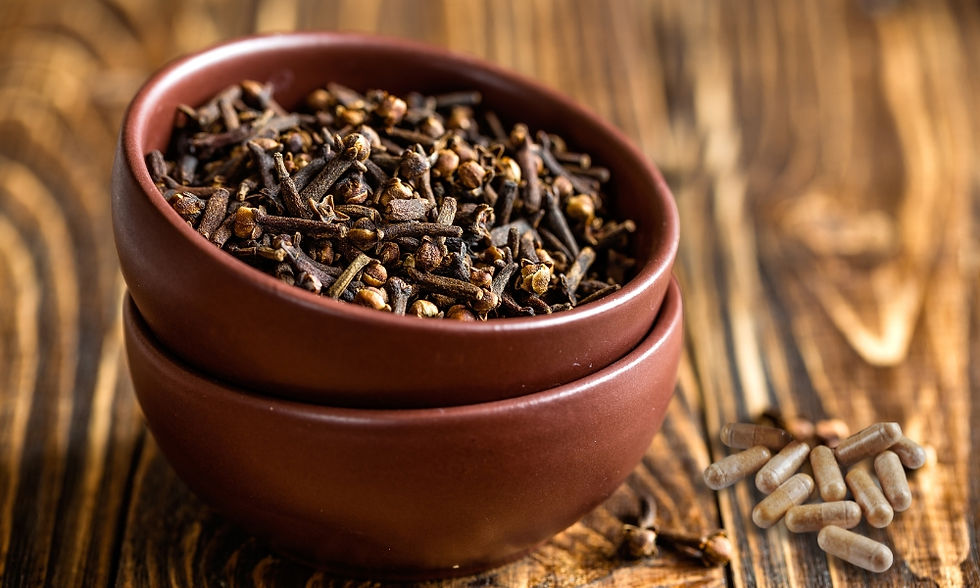Clove Oil for Skin and Hair: Natural Remedies with Science
- Herbs around us
- Sep 20, 2025
- 6 min read
Updated: Sep 26, 2025
Clove oil, especially when derived from organic clove buds, has made a resurgence in modern beauty and wellness routines. For generations, cultures across Asia and the Middle East have used clove essential oil as a natural remedy for skin irritations and scalp health. Today, scientific validation supports many of these traditional claims, offering clear guidance on how and why clove oil works. Whether you are targeting acne, uneven tone, or scalp issues like dandruff, the bioactive compounds in clove oil deliver benefits when used carefully and correctly.
At the center of these effects is eugenol, a potent compound found in clove buds and oil extracts. Eugenol possesses powerful antioxidant, antimicrobial, and anti-inflammatory properties. These effects aren’t just folklore—they’ve been studied in dermatological and microbiological research, particularly as the demand for natural beauty alternatives grows.

Image: Canva
Clove Oil and Skin Health: A Deep Dive
Acne Management Through Natural Antibacterial Action
One of the most researched benefits of clove oil is its ability to manage acne-prone skin. The eugenol in clove oil targets Cutibacterium acnes (formerly Propionibacterium acnes), a bacterium that plays a major role in acne development. In clinical lab studies, clove oil was shown to reduce bacterial load and inflammation when applied in diluted topical formulations.
Unlike synthetic solutions that may dry or irritate the skin, clove oil provides both antimicrobial and anti-inflammatory effects. These dual actions help control breakouts while soothing irritated skin. For people with oily or combination skin types, this can be especially useful, though it must always be diluted in a carrier oil like jojoba or argan oil to prevent sensitization.
Skin Brightening and Antioxidant Protection
Another emerging area where clove oil shines is skin tone improvement. The high antioxidant capacity of eugenol and related phenolics found in organic clove oil helps neutralize free radicals that contribute to uneven pigmentation, sun damage, and premature aging. Some users notice improved clarity and brightness after regular use of clove-infused serums or spot treatments.
This antioxidant protection may also slow the breakdown of collagen, giving clove oil potential anti-aging applications. Although more long-term trials are needed, the topical benefits are promising for those seeking alternatives to synthetic brightening agents.
Soothing Inflammation and Minor Irritations
Clove bud oil can act as a calming agent for various skin discomforts, including mild eczema and insect bites. Its anti-inflammatory properties have been noted in both traditional texts and biomedical journals. Applied properly, clove oil reduces redness and discomfort associated with histamine reactions or skin sensitivity—again, dilution is essential.
It's important to note that due to its potency, clove essential oil should never be applied directly to the skin without mixing. A typical safe dilution is 1–2% of clove oil in a carrier base. Spot testing is always recommended, particularly for individuals with sensitive skin or a history of dermatitis.
Benefits of Clove Oil for Hair and Scalp
Natural Dandruff Control Backed by Antifungal Research
The antifungal qualities of clove oil extend to the scalp, where it can inhibit the growth of Malassezia, the fungus most responsible for dandruff. Eugenol helps reduce the fungal population, soothe itchiness, and decrease inflammation around hair follicles. In controlled studies, clove oil ranked among the more effective essential oils for managing dandruff symptoms, especially when used with other scalp-friendly ingredients like tea tree or rosemary oil.
Many clove-infused scalp oils and hair masks now feature a blend of clove bud oil with hydrating oils such as coconut or castor oil. These formulations offer dual benefits: fungal control and nourishment for dry, flaky scalps.
Scalp Circulation and Follicle Stimulation
Poor scalp circulation is often linked to sluggish hair growth or thinning. Eugenol naturally enhances microcirculation in the skin, which in turn delivers more oxygen and nutrients to hair follicles. Though research is ongoing, anecdotal reports and early dermatological studies show that clove oil massage may help stimulate growth or prevent hair loss when used regularly.
It is not a standalone hair growth treatment, but when added to a balanced care routine, organic clove oil may contribute to stronger, healthier roots. As with skin, the key to effectiveness is consistency and safe application.
How to Use Clove Oil Safely in Your Routine
Clove oil is potent and requires thoughtful handling. For most topical applications, a dilution rate of 1–2% is recommended. This translates to roughly 2–3 drops of clove oil organic per tablespoon of carrier oil, such as sweet almond, jojoba, or grapeseed oil. Using it undiluted can cause burns or severe irritation, especially on the face or sensitive skin areas.
For facial use, a nighttime routine works best. After cleansing and toning, apply a small amount of clove oil blend as a spot treatment for acne or hyperpigmented areas. Those with sensitive skin should patch-test on the inner arm and wait 24 hours before applying it to the face.
When using clove oil for scalp treatments, massage the diluted blend directly into the roots, leave it on for 15–30 minutes, and rinse thoroughly. Some people prefer to use it overnight, but be cautious with pillow stains and skin transfer. Rinse thoroughly to avoid buildup or irritation.
For hair masks, combining clove oil with nourishing ingredients like aloe vera gel, coconut milk, or yogurt provides a hydrating base while allowing clove’s antimicrobial and circulatory benefits to take effect.
Comparing Clove Oil with Other Natural Oils
To better understand where clove oil fits in your skin and hair care routine, consider this comparison with two commonly used natural oils:
Feature | Clove Oil (Organic) | Tea Tree Oil | Rosemary Oil |
Primary Compound | Eugenol | Terpinen-4-ol | Cineole, α-pinene |
Antibacterial/Antifungal | Very strong (broad-spectrum) | Strong (acne & dandruff-focused) | Moderate (mostly scalp-related) |
Skin Brightening | Yes, supports even tone | Limited | Minimal |
Circulation Boost | Yes (supports follicle health) | Not significant | Yes (known for stimulating growth) |
Scent Profile | Warm, spicy, sweet | Sharp, medicinal | Herbaceous, woody |
Best For | Acne, scalp irritation, dull tone | Acne, fungal infections | Hair growth, scalp stimulation |
Caution | Can irritate skin if undiluted | May cause dryness with overuse | Can trigger allergies in some individuals |
While tea tree and rosemary oils have specific strengths, clove oil offers a wider range of benefits when it comes to both antimicrobial protection and antioxidant delivery. It is particularly suitable for people seeking a single oil that can address both acne and scalp issues simultaneously.
Myths vs. Science: Debunking Clove Oil Misconceptions
Despite its popularity, several misconceptions surround clove oil:
Myth: Clove oil can be used directly on the skin or scalp. → False. Direct application of essential oils like clove oil can lead to chemical burns or allergic reactions. Dilution is non-negotiable.
Myth: All clove oils are equal. → False. The quality and efficacy of clove oil vary depending on extraction methods, botanical source (clove buds vs. stems), and whether it's organic. Always look for clove bud oil, as it contains the highest concentration of beneficial compounds.
Myth: You’ll see overnight results. → False. Like all botanical treatments, clove oil delivers results gradually. Consistency and proper usage determine its effectiveness.
Understanding these facts empowers users to integrate clove oil responsibly and maximize its natural properties without risking skin health.
Who Should Avoid Clove Oil?
While clove oil is generally safe for topical use when diluted, it is not suitable for everyone. Pregnant or breastfeeding women should consult a healthcare provider before using any essential oil, including clove. Individuals with extremely sensitive skin, eczema, or a history of allergic reactions should proceed with caution.
For people using prescription skin treatments (like retinoids or corticosteroids), adding clove oil to the routine might interfere with or irritate. It's best to stagger usage or check with a dermatologist.
Clove oil is also not recommended for infants or young children, as their skin barrier is more permeable and prone to irritation.
A Natural Ally Worth Exploring
Clove oil, when used correctly and consistently, brings a unique blend of medicinal heritage and scientific backing to modern skin and hair care routines. It offers real, research-supported benefits—particularly for acne-prone, irritated, or dull skin types, and scalps affected by dandruff or inflammation. What makes clove oil even more impressive is its multi-functionality: a single organic extract that bridges beauty and wellness.
This ancient remedy, distilled from clove buds, has adapted to modern needs without losing its core value. Whether you are blending it into a scalp serum, a nighttime spot treatment, or a restorative hair mask, clove oil can become a sustainable, natural upgrade in your beauty ritual.
References
Chaieb K, Hajlaoui H, Zmantar T, et al. The chemical composition and biological activity of clove essential oil, Eugenia caryophyllata (Syzigium aromaticum): A short review. Phytotherapy Research. 2007;21(6):501–506.
Pramod K, Ansari SH, Ali J. Eugenol: A natural compound with versatile pharmacological actions. Natural Product Communications. 2010;5(12):1999–2006.
National Center for Complementary and Integrative Health (NCCIH). Herbs at a Glance: Clove. U.S. Department of Health & Human Services.
Ogunwande IA, Olawore NO, Ekundayo O, et al. Chemical composition of essential oils of Syzygium aromaticum (clove) and their antimicrobial activities. African Journal of Microbiology Research. 2005;3(10):501–506.















